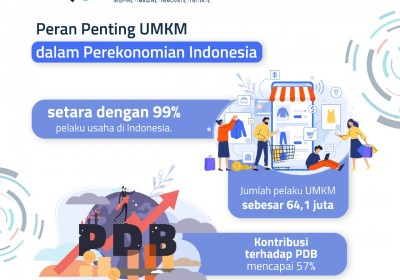Government prepares stimulus packages for UMKMs
February 25, 2021
JAKARTA - The Ministry for Small-to-Mid Scale Businesses and Cooperatives (KemenkopUKM) is preparing several stimulus packages that aim to help recover the Indonesian economy.
MenkopUKM Minister Teten Masduki said that the national economic recovery plan (PEN) have outlined 3 specific programs for PEN 2021 with a total investment value of Rp 29.21 trillion, which include micro-credit (KUR) loan interest rate subsidies, spending funding boosts and investment subsidies.
The ministry will allocate Rp 14.84 trillion to fund the micro-credit subsidies, which will be at 6%, and fund allocation for UMKM spending funding boosts will be at Rp 11.05 trillion, which also includes funds for COVID-19 countermeasures. Plans to implement investment subsidies through cooperatives will be allocated Rp 1 trillion.
“There are also plans for a 0% interest rate micro-credit loan subsidy, with an allocation of Rp 2.32 trillion and a target of 5 million micro-scale businesses,” Minister Teten said during a virtual meeting with the Regional Representatives’ Council’s (DPD) Commission IV on Monday (8/2).
KemenkopUKM secretary Arif Rahman Hakim said that UMKMs will be provided with additional funding mechanisms that are easy to access. The KemenkopUKM is actively in the middle of efforts to reduce the overall interest rates of micro-credit loans. “Current interest rates for micro-loans are at 9%, and we feel it can be lower,” Arif said on Wednesday (10/2).
Arif added that the role of UMKMs in Indonesia’s economy is an incredibly crucial one, considering they contribute to 57% of the country’s GDP. He feels that this figure can increase due to the fact that there are 64.1 million UMKM businesses in Indonesia, which makes up 99% of all businesses.
Minister Teten also noted that these recovery measures for UMKMs are designed to be as effective as possible and will continue to be implemented throughout this year.
This is reflected by the results of surveys held by the National Poverty Reduction team and the University of Indonesia’s Institute for Economic and Social Research (LPEM UI) which show that 99% of respondents approve of the measures.
“Up to 99% of all participating UMKMs in those two surveys agree that it was the right thing to do,” Minister Teten said during the ‘Strategi UMKM Bangkit’ discussion on Monday (1/2).
Many UMKMs in the survey said that the additional emergency funding helped them acquire production materials, therefore emphasizing the benefits of KemenkopUKM’s programs for the industry.
“This program has greatly helped many UMKMs in terms of funding as they can keep buying their needed materials. They have all proven to be resilient during this time of crisis and I believe that they can keep doing so,” Minister Teten added.
Up to 53.5% of the programs’ recipients were previously unemployed, but later opened micro-scale businesses after receiving the funding. However, some of them have since closed their businesses due to the funds running out.
Minister Teten said that the declining purchasing power due to the pandemic was bolstered slightly through similar social programs implemented by other ministries, such as the social assistance program created by the Social Affairs Ministry (Kemensos) and the wage stimulus subsidies managed by the Manpower Ministry (Kemnaker).
“I feel that the programs initiated by the KemenkopUKM, the Kemensos and the Kemnaker have all contributed positively towards helping boost our purchasing power, which was impacted by the COVID-19 pandemic,” he said.
Indonesia’s Research Institutions Supporting the Development of the Electric Vehicle Industry
Indonesian Muslim Fashion and Cosmetics IKMs Shine at Dubai World Expo 2020
Govt Steps Up UMKM Transformation Efforts in the Midst of Pandemic Slowdown
Govt Encourages Promotion of IKM Products in Digital Era
Government Begins Developing Maritime Training Center in Makassar
Tweets by IDDevForum
